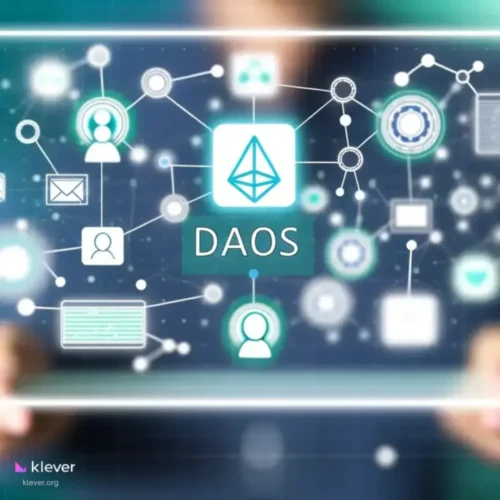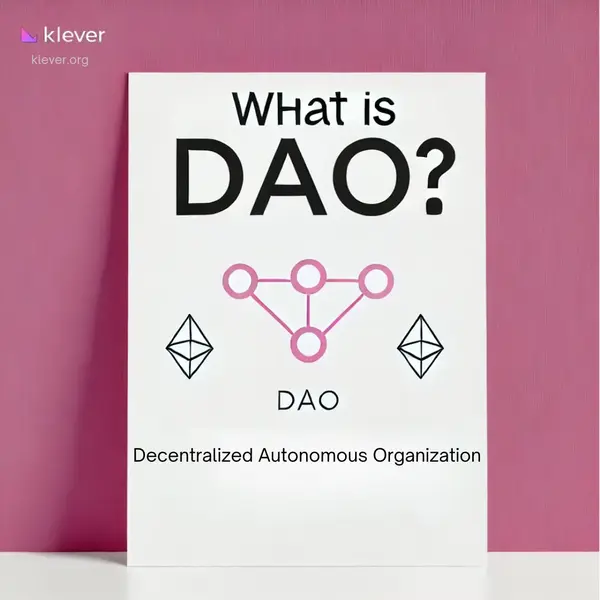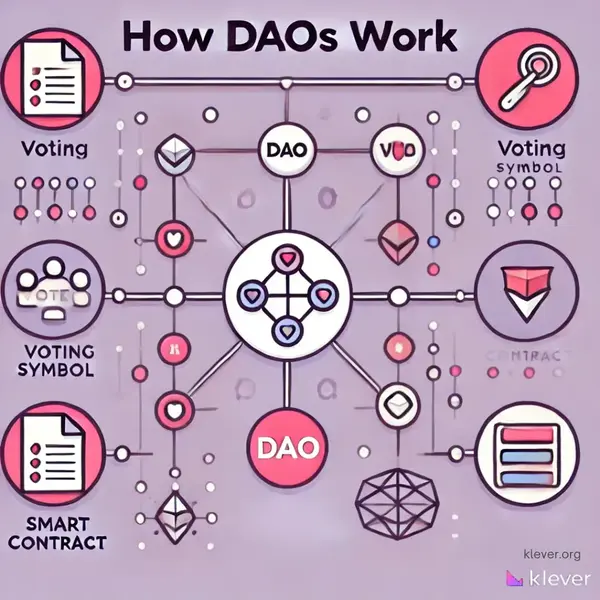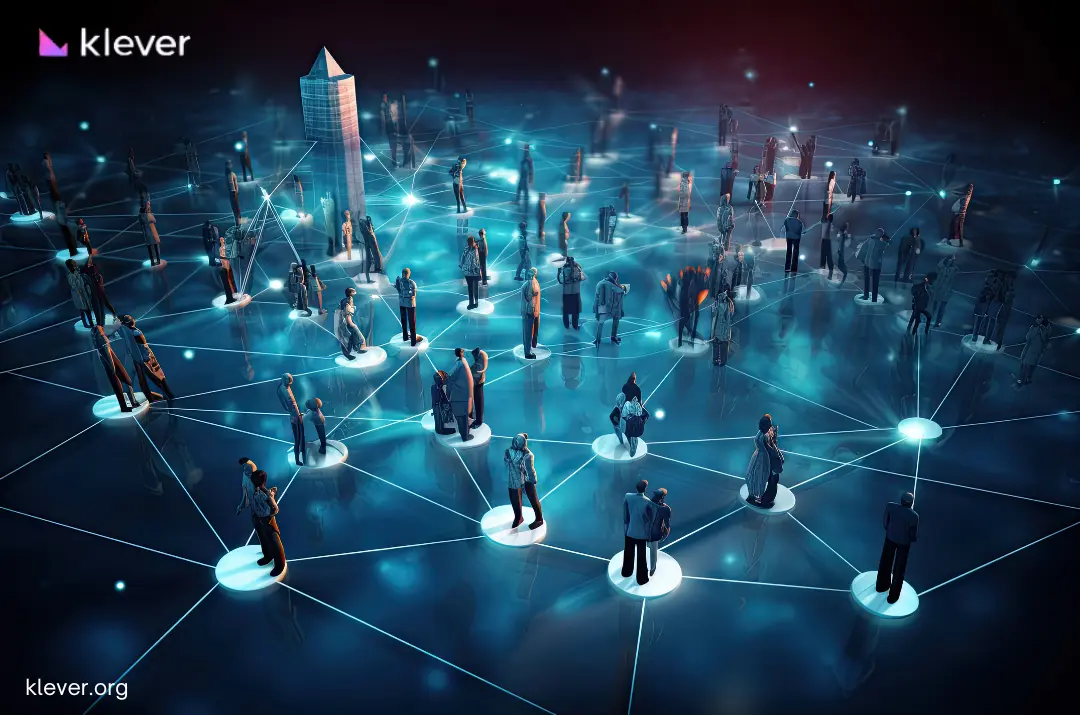
Decentralized Autonomous Organizations (DAOs) are a revolutionary concept in the world of blockchain and cryptocurrency. Specifically, they structure organizations in a new way, using blockchain technology to create decentralized, transparent entities governed by their members without a central authority. This article aims to introduce DAOs to readers with little to no prior knowledge of blockchain, explaining what they are, how they work, and their potential impact.
Table of Contents
What is a Decentralized Autonomous Organizations?

A Decentralized Autonomous Organization, or DAO, is an entity that operates through rules encoded as computer programs called smart contracts. DAOs by design operate without central leadership, as opposed to traditional organizations which have a center governing entity. DAO members control it and vote on proposals using these tokens. These tokens usually correspond to voting power and allow members to steer the direction of the organization.
Decentralized Autonomous Organizations are based on blockchain technology, which means that all transactions and decision records will be added to the public ledger so they can never be altered. This un-hiding makes every action visible and verifiable by any one which brings trust among the participants. DAOs are stronger and less prone to single points of failure than the traditional organizations due their inherent decentralized nature.
The Rise of DAOs
The rise of DAOs has been fueled by the increasing adoption of blockchain technology and the growing interest in decentralized finance (DeFi). Moreover, DAOs have provided a new means of cooperation and organization to appeal innovators, and entrepreneurs who believe in more democratic governance. Several sources predict that Decentralized Autonomous Organizations will become increasingly popular and full-featured as blockchain tech progresses.
How DAOs Work

Decentralized Autonomous Organizations operate through a framework of decentralized governance and smart contracts. Let´s see more deeply.
Decentralized Governance
A DAO fundamentally rests on decentralized governance. In a typical organization, a centralized authority or board of directors always makes decisions. A DAO instead runs on a model of democracy whereany decision comes to the people who own part or all ownership. This is done using a token voting system.
A DAO consists of individuals who possess tokens that represent their vote on a proposal. The proposal outlines the action to take and the associated costs or benefits. Members then vote on the proposal using their tokens. If the proposal receives a majority vote, it is approved and executed automatically by the smart contracts governing the Decentralized Autonomous Organization.
This process ensures that all members have a say in the governance of the organization, promoting transparency and fairness. Additionally, Because smart contracts encode the rules and procedures, the system automatically executes decisions, preventing alteration by any single entity. This reduces the risk of corruption and ensures that the organization operates according to the agreed-upon rules.
Smart Contracts and DAOs
Smart contacts are contracts with the terms of the agreement between buyer and seller being directly written into lines of code. Moreover, they are an essential component of DAOs, providing tools for decentralized governance and process automation. Smart contracts operate as transaction and rule enforcement mechanisms that automatically act on a certain set of conditions.
In a DAO, smart contracts handle voting, making proposals and fund distribution accountable to them. For example, if a proposal to fund a project passes, the smart contract automatically sends the money to the project. This automated process makes decisions swiftly and transparently, removing intermediaries.
Smart contracts enhance DAOs’ security and immutability, making the decisions verifiable, irreversible and hence more secure & immutable benefiting from smart contracts. So, this security audit needs to be rather well done – we all saw what happened with The DAO.
Decentralized Autonomous Organizations vs. Traditional Organizations
Decentralized Autonomous Organizations differ significantly from traditional organizations in several ways:
Structure: Traditional organizations typically have a hierarchical structure with centralized control, where a few individuals make decisions on behalf of the group. In contrast, Decentralized Autonomous Organizations operate on a decentralized model where all members have a say in governance through token-based voting.
Transparency: In traditional organizations, decisions and financial transactions are often opaque, with limited access to information for ordinary members. DAOs, on the other hand, are fully transparent, with all actions and transactions recorded on a public blockchain.
Security: Traditional organizations are based on centralized systems that can be easily hacked, manipulated and frauded. Conversely, DAOs leverage blockchain technology to ensure that all transactions and decisions are secure, immutable, and tamper-proof.
Decision-Making: In traditional organizations, decision-making is often slow and bureaucratic, with layers of approvals and intermediaries. Conversely, DAOs streamline this process through smart contracts that execute decisions automatically based on the collective vote of members.
Impact of Decentralized Autonomous Organizations

The impact of Decentralized Autonomous Organizations is profound and far-reaching, offering new possibilities for organizing and managing collective efforts across various sectors. Here are some key areas where DAOs are making a difference:
Decentralized Finance (DeFi): DAOs play a crucial role in the DeFi ecosystem, as they may provide decentralized governance over financial protocols and platforms. Transparent and available financial services which in turn reduces the need for banks and intermediaries as well.
Venture Capital: DAOs can act as decentralized venture capital funds where all members vote on investments. Consequently, this opens up investment opportunities to democratized, qualified investors who can make more informed investing decisions.
Charitable Organizations: DAOs can enhance transparency and accountability in charitable organizations. Thus, donors can monitor the utilization of their contributions and participate in decision-making processes, ensuring proper channeling of funds.
Community Projects: DAOs enable communities to organize and manage projects collaboratively. So, whether it’s a local initiative or a global movement, DAOs provide a framework for collective decision-making and resource allocation.
Digital Identity and Governance: DAOs offer innovative solutions for digital identity management and governance, providing secure and transparent mechanisms for verifying identities and managing access to services.
In conclusion, decentralization is often a lengthy process, and our aim is to achieve it for KVM by empowering the Klever DAO. This will enable a Klever Blockchain based governance governed by clear rules encoded on the blockchain overseen and managed by its internal members.
Klever DAO enables true community governance with a proposal and voting system for holders of Klever Finance Token (KFI). This strategy allows users and developers to participate in this network, a level of involvement previously unavailable to them.